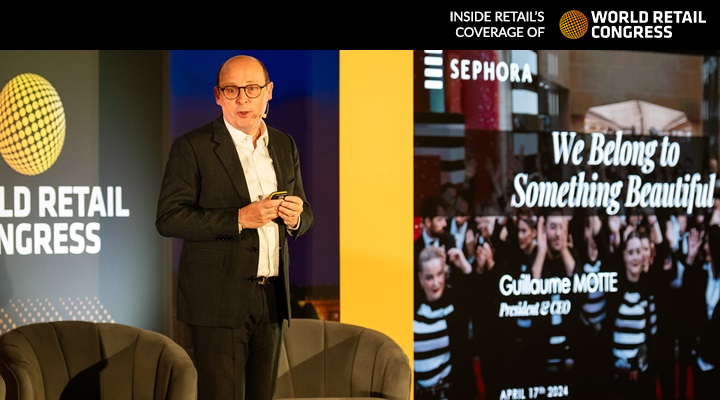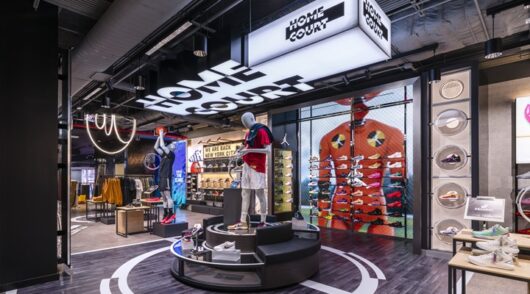French prestige beauty retailer Sephora is widely recognised as a leader in its category, with 3000 stores and 52,000 team members operating worldwide.
Founded in Limoges in 1969, the company was acquired by LVMH in 1996 and over the past decade, it has been on a growth trajectory, as evidenced by its record sales and profits in 2023.
As part of LVMH’s selective retailing division, Sephora doesn’t typically break out its results but global president and chief executive Guillaume Motte recently shared an overview of the retailer’s global growth in his keynote speech at the World Retail Congress in Paris.
“Specifically in terms of geographies, when you look at where it’s coming from, you see that in North America, which is the most important market in the world, we managed to grow by more than 27 per cent,” Motte said.
Other regions also grew by significant double digits: 23 per cent in Europe, 28 per cent in the The Middle East, 27 per cent in Southeast Asia and 43 per cent in Latin America. China was at an outlier at 2 per cent.
“The fact that we enjoy strong broad-based growth tells me that there is something that we are doing right across the globe,” he said.
While the beauty category tends to be resilient in times of economic downturn, Motte noted that Sephora outperformed the market.
“We didn’t slightly beat the markets, we smashed some of the numbers. We grew twice to six times faster than the prestige beauty market in most geographies,” he said.
Here, he shares four key factors behind the retailer’s success.
1. Product curation
When it comes to stocking products, Motte said it’s about curating brands, not having the broadest assortment.
“We do have a very strong point of view in beauty, and we express it. We make choices; we actually carry brands that we love,” he said.
“The second thing that we do very strongly is we partner with brands. For us, the word partner is not a gimmick.”
He pointed to Drunk Elephant and Makeup By Mario as two examples of how the retailer has helped provide a platform for founder-led brands to grow globally.
“I think there is something about Sephora, which is about cooking in the kitchen with brands, partnering with brands, and showing them the way to market expansion because it is also essential to the growth.”
An estimated 50 per cent of brands sold by Sephora are exclusive to the retailer.
2. Experience
For Motte, the store experience is “the heartbeat” of Sephora. “We have always believed in stores,” he said, noting that Sephora opens about 200 stores a year.
“Sometimes I hear retail is dead, and you know what, boring retail is, that’s for sure. It has to be lively, it has to be exciting,” he said.
Part of this involves bringing technology into stores to improve the experience. For instance, the retailer has introduced skin diagnostic tools that enable store staff to better advise customers on the right products for their specific needs.
“We believe in technology enriching the relationship and not replacing the relationship,” Motte said.
Globally, Sephora staff conduct 200,000 skin diagnostic sessions a week, which equates to 10 sessions a minute.
3. Community
Loyal customers are invaluable in retail, and Sephora has 160 million customers in its database, 60 million of whom are “hyperactive,” Motte said.
“That’s a critical asset because it enables us to have a seamless journey with them,” he said.
Sephora seeks to “pamper” its loyal customers by giving them extraordinary experiences and things that money can’t buy. In 2018, the retailer launched Sephoria, an immersive beauty event enabling customers to meet brands and access exclusive products.
“We realised that if you’re in fashion, you have some outstanding moments where the designs come to life. So we created our own fashion show, which is a place where we bring the best of beauty and invite our customers to come and play and test beauty products,” Motte explained.
Sephoria has now grown to have 140 participating brands and three global locations, including New York, Paris and Shanghai.
“It’s not only [about] the loyalty program, which is very important, of course, but it’s how do you create engagement? How do you create passion around your sector,” he said.
Another example of the way Sephora builds community is its partnership with Rare Beauty, the makeup line launched by Selena Gomez, which is available exclusively at Sephora. For World Mental Health Day last October, Sephora donated 100 per cent of the sales of Rare Beauty products to the Rare Impact Fund to fight against mental illness.
“We donated 1.7 million euros, the biggest donation ever made by Sephora,” Motte said. “It felt good because it aligned with our purpose and because our consumers were so happy to participate; to feel that we were more than business.”
4. Team
The final factor in Sephora’s success is the most important one, according to Motte, and that is the team.
“Retail is a people business. People make all the difference,” he said.
For Motte, it’s the responsibility of retailers to inspire their teams and give them opportunities to grow and develop. Sephora aims to fill 70 per cent of its roles internally, and it is constantly looking for ways to make the workplace attractive for team members.
“We are leading in terms of scheduling. In the Middle East, where the norm is six days a week, we’ve moved to five days a week of work. In France, we’re giving weekends now,” he said.
“In the beginning, people were saying, you’re crazy. How are you going to manage on Saturday? We’re going to manage because our people deserve it.”
Motte put it simply: “If we want to stay attractive, not only we need to deliver in our category, but we need a leader in the best practices of retail.”
Further reading: Three key takeaways from the World Retail Congress







